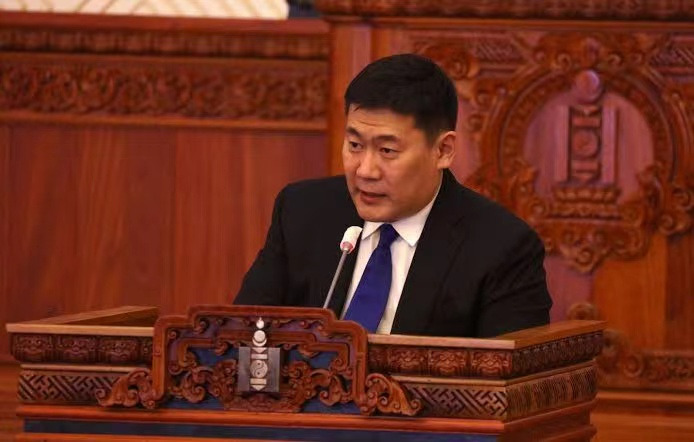
Observing the parliamentary discussions on agendas such as amendments to the 2024 state budget and the 2025 state budget proposal, many have criticized this Parliament, referring to as one without an opposition.
Indeed, as the majority party, the Mongolian People’s Party (MPP), sought and succeeded establishing a coalition government with opposition parties, including Democratic Party (DP) and HUN party. Even DP, which is eligible and has formed a party group in the parliament, does not oppose the government or the majority party, as it is taken part in the coalition government.
The root cause of this “chaos” is arguably the questionable, possibly unconstitutional, appointment of the Prime Minister, L.Oyun-Erdene following the parliamentary election last June.
Therefore, on November 05, 2024, as a citizen, I filed a petition with the Constitutional Court (referred to as “Tsets” in Mongolian), questioning the legality of the parliament’s resolution No. 05, dated July 05, 2024, concerning the appointment of the Prime Minister L.Oyun-Erdene, along with the procedure used to issue this resolution. Here is why:
On July 5, 2024, the ruling MPP nominated L.Oyun-Erdene as Prime Minister again. However, just two days earlier, on July 3, MPP Secretary N.Enkhbaatar announced that the party had established a working group to consult and negotiate with other parties and coalitions on forming a coalition government. The establishment of such a group prior to nominating a candidate for prime minister clearly implies that determining the premier’s role was part of the negotiation.
However, according to Article 39.2 of the Constitution, when one party holds a parliamentary majority, it must nominate a candidate for prime minister independently, without consulting other parties or coalitions.
Article 39.2 of the Constitution states:
“The proposal on appointing the person nominated as the Prime Minister i) by the party or coalition which has obtained majority of seats in the State Great Khural, or ii) by the party or coalition which has obtained the highest number of seats in the State Great Khural through constituting the majority in consent with the other parties and coalitions if none of the parties or coalitions has obtained majority seats in the State Great Khural, or iii) in the other cases, by the majority constituted through consent of the parties and coalitions which have obtained seats in the State Great Khural, shall be submitted by the President to the State Great Khural within five days.”
In other words, when one party already holds the majority in parliament, consulting or forming a coalition with other parties prior to nominating the prime minister is not allowed (i.e., prohibited).
This provision underscores the requirement that the candidate for prime minister be a trusted figure within the majority party if there is one. For instance, based on this June’s election results, if just five MPP members opposed L.Oyun-Erdene’s appointment, he would not have had the necessary support to be confirmed as Prime Minister.
In light of the procedural irregularities observed, there is reasonable ground to suspect that he may have circumvented constitutional principles to secure his appointment.
These concerns are shared by a broad range of citizens, political analysts, and researchers. Thus, it is imperative that the Constitutional Court review and determine whether the July 5, 2024, resolution (No. 05) and the related decisions made by parliament comply with the Constitution.
This situation raises the question: “Can the Constitutional Court review decisions and actions of political parties related to the nomination of a Prime Minister?” If the nomination process is indeed found to be flawed, the resulting appointment could and should be deemed invalid.
First, the Constitutional Court should seriously consider that, despite the presence of four parties and one coalition in parliament, MPP’s unprecedented and most likely illegitimate forming of coalition now controls 96 percent of the parliament seats. In other words, this situation renders the current parliament even less representative than when MPP previously held a vast majority situation (for the last eight years). As mentioned earlier, there is effectively no opposition, nor has DP, as a party group formed in Parliament in accordance with the Law on Parliament, expressed any opposition.
Furthermore, the Constitutional Court has previously ruled on constitutional compliance regarding the number of Members of Parliament eligible to serve in the government under the amendment restricting the number of members who could hold “dual positions” (simultaneously serving as both a member of Parliament and a government member) to four. The Court clarified that it has ultimate authority to ensure constitutional compliance and to resolve disputes related to violations, as stipulated in Article 66.2 of the Constitution. Based on this precedent, it is expected that the Court will take up and carefully consider this case.
According to the Law on Constitutional Court Procedure, a single judge will first review the petition and decide whether to open a case before the constitutional court within 14 days. If the judge refuses to open a case, the petitioner may appeal against the refusal, and the appeal shall be reviewed by a lower seat of the Constitutional Court, consisting of three judges.
For better governance that ensures checks and balances and the separation of powers, it is hoped that the Constitutional Court will open a case and review this practice, and allow citizens the opportunity to challenge and discuss this questionable and unprecedented action.